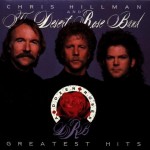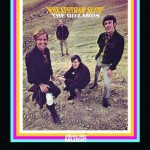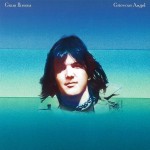Herb Pedersen has contributed his instrumental and vocal talents to recordings and performances by a wide range of artists over the years, including John Denver, Kris Kristofferson, Linda Ronstadt, Jackson Browne, Emmylou Harris, James Taylor, and many, many more. His band memberships have included bluegrass powerhouse The Dillards in the late Sixties and early Seventies, and the Desert Rose Band with ex-Byrd / ex-Flying Burrito Brother Chris Hillman.
This interview was for a preview article for the 5/3/15 performance by Hillman and Pedersen at the Plaza Playhouse Theater in Carpinteria, California. It was done by phone on 4/22/15.
Jeff Moehlis: What can people look forward to at the upcoming show?
Herb Pedersen: Basically, what we do in this configuration is kind of a Desert Rose Band acoustic show. Because John Jorgenson is with us, and possibly Bill Bryson – I’m not sure about that yet. He was our original bass player. So it could be a quartet, but probably a trio.
The material will be a lot of things that Chris has written over the years, plus some things that we did with the Desert Rose Band, and some of my tunes.
JM: How did you and Chris first meet each other and start playing together?
HP: Oh, we met years ago, 1963, at a Bluegrass Festival at the Ice House in Pasadena. Bob Stane, who was the owner of the Ice House for many, many years, had a bluegrass festival. There were about five different bands, and Chris was working with The Golden State Boys at the time. So that’s how we met. I had a band called The Pine Valley Boys. Like I said, there were four or five bands there. That’s when I met him. We got along really well.
We never worked in a group together until Desert Rose, though. He went off with The Byrds after his bluegrass thing kind of petered out with The Golden State Boys. I kind of lost track of him because he was in the rock world at that point, and I was still in bluegrass. We would see each other occasionally. I guess, one of the times was when I was working with Emmylou Harris. We did a show at Royce Hall, and he was there with The Burrito Brothers. We kind of reconnected. Then he went on to do a couple of solo albums, and he called me to come in and sing with him and play some banjo, whatever, and it seemed to click really well. So we just kind of kept in touch with that.

Then about 1984 Dan Fogelberg was doing his album High Country Snows in Nashville, and he called me to come down and play on that. So I was on the album. And then Dan wanted to go out and promote the album, so he wanted to put together an opening band, kind of a bluegrass kind of a thing, and then he would come out after we would perform. That’s when he called Chris to put something together, and then Chris hired John Jorgenson, Bill Bryson, and myself, and we went out as an acoustic quartet. After that whole thing we did several shows in major market areas, and then John Jorgenson had the idea of plugging in and seeing what the tunes would sound like electrically. So we added steel guitar and drums, and Bill went to electric bass, and that was the beginning of the Desert Rose Band.
JM: There’s a lot of amazing stuff in your musical history. Way back when, maybe before you met Chris, I read that you played with Jerry Garcia and David Grisman and people like that. What was that like? Was there any sense that, “Wow, we might be able to do this for a living”?
HP: Well, we were all kind of at that age. We were all out of high school at that point. Music was first and foremost in our heads. We wanted to become successful at it, and we loved the kind of music that we were playing at the time. So, you know, you just work hard and try to sustain yourself while you’re pursuing your music career. That was kind of the feeling of everybody that I knew up in the Bay Area.
JM: Some of your earliest recording credits were with The Dillards. You’re from Berkeley, and they were a bunch of guys from Missouri. How did you end up joining that band?

HP: When we had The Pine Valley Boys down here in L.A., The Dillards moved out from Salem, Missouri. I had gone to see them play, and I met all the guys. Dean Webb, the mandolin player, remembered me, and then when Douglas [Dillard] left the band he called me up – I was in Nashville at the time – and he asked if I would be interested in trying out for the banjo slot. I said, “Sure, I’d love to!” I was looking for a way to come back to California anyway. So I was working with two guys, Vern & Ray, Vern Williams and Ray Park, and we were scheduled to come out and play the Ash Grove here in Hollywood. So we came out and I went over to Rodney Dillard’s house and did the audition and everything worked out fine. So I found my way back to L.A., what I wanted to do. I was with them for a couple of years, doing two albums with them – Wheatstraw Suite and Copperfields.
JM: Those are hard to track down nowadays, but they’re really amazing albums. Do you feel like they unfortunately got lost a bit in the shuffle? Because they’re really good.
HP: Yeah, they are. You find them here and there. I think some company has reissued them in a double CD package. You can find those, rare as hen’s teeth, but they’re around somewhere.
JM: During the Seventies and beyond you recorded and performed with a number of amazing musicians, some we’ve mentioned already. Are there any that particularly stand out to you?
HP: Pretty much all of the people that I’ve recorded with, they all had their main points of being really good at what they did, from John Denver to Gordon Lightfoot to James Taylor to Chris Hillman. Everybody that I worked with knew what I did, so I could bring something to whatever project we were working on. I just feel blessed that I could work with all of them. But nobody particular stands out like, “Wow, that was just the best.”
JM: It’s all good, right?
HP: They were all great. You know, there have been so many recording sessions, it would take me a week to figure out who exactly was the one to say that he was the greatest. Or she. With Emmylou Harris, Linda Ronstadt, Dolly Parton, all these people, it was all different kinds of music, and they were all just great artists.

JM: One that I’m curious about is Gram Parsons, who you played with on the Grievous Angel album. What was that experience like?
HP: I was a session player. I did a lot of studio work, as you know, in L.A. It was one of those projects that I got called to participate in. I was just kind of a sideman like the rest of the guys in the room. You know, to be really honest of you, I wasn’t a big follower of Gram. I knew who he was, and I knew he had worked with Chris in The Burrito Brothers and also in The Byrds, but I wasn’t really a follower of what he did musically. So I was just kind of called to come in and play – I forget what I played, banjo or guitar or did some background vocals, or whatever.
JM: At the other end of the spectrum, I see that you played with Weird Al Yankovic. That sounds fun! What was that like?
HP: [laughs] There again, it was just a one-off thing. I can’t remember what it was. I don’t even know if it was a real serious tune or one of his really weird tunes. But he seemed very nice, and knew what he wanted. That always helps when you go into a session, that the artist knows what he wants to have done, not sitting around all day trying to figure it out.
JM: What advice would you give to an aspiring musician?
HP: It’s like, aspiring to what? What do you want to do with your music? Do you want to be a professional, or do you want to do it on the weekends? A lot of times people ask that of Chris, when he and I are out as a duet. He says, “Stay in school. Get your degree. Then have fun with music. But you always have something to fall back on.” And that’s sage advice, I think. It’s really important.
Because when we started, you’ve got to remember that the music business was kind of a cottage industry, especially for bluegrass and folk music and country-rock and all that. It was all in the beginning. So there were a lot of people who wanted to do it, but very few that could really pull it off. So we were very lucky in the beginning. But my advice to musicians is just to work hard at it. If you have the talent you will be heard.
JM: What are your plans? What’s in the works for the near future?
HP: I have a band called Loafers’ Glory, a bluegrass band down here. We’re getting ready to go in and do our second CD. I’m very excited about that. And I also work with John Jorgenson’s bluegrass band called J2B2, meaning John Jorgenson Bluegrass Band. We just finished a CD in Nashville at Sheryl Crow’s studio. That should be released sometime this summer, I’m sure. And working, of course, with Chris is my favorite. When we’re not busy doing stuff I find things to do. And producing records, that’s something I like to do as well.


Discussion
No comments for “Interview: Herb Pedersen”